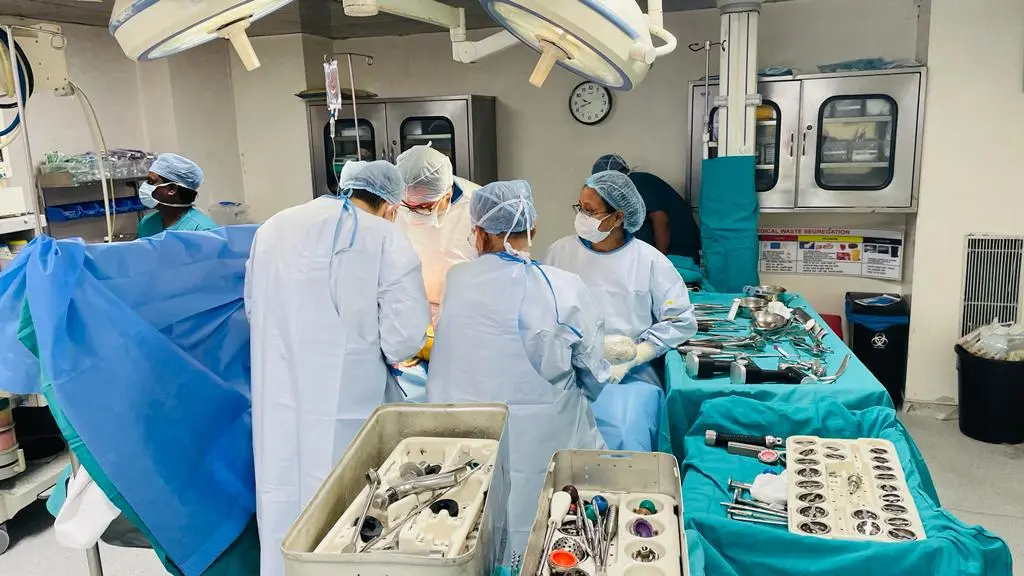Thousands of people suffer from hip-related problems in Delhi & other neighbouring states like U.P, Rajasthan, Punjab, Haryana, Himachal & Jammu Kashmir. Every year, a large number of these patients successfully undergo total hip replacement surgery in Delhi. Surgeons generally recommend hip replacement surgery if other options like medicines, physiotherapy & other joint preservation techniques do not provide relief to the patient.
However, just like any other surgery, there are some risks or complications associated with this procedure as well although most of them can be very well prevented. It also depends on patient’s overall health, age, weight and other medical co-morbidities. Generally it’s advisable that you report the complications to your doctor as soon as possible.
Wound Hematoma
Experts believe that a small quantity of blood leakage from a wound after surgery is normal. This generally stops after a few days of surgery. In rare cases, blood may collect in the wound and cause swelling.
This is known as wound hematoma. This can happen more commonly in diabetics, patients who are on blood thinners, & revision hip replacement surgery cases. If this haematoma continues to drain then patients can experience other possible complications also like delayed wound healing or infection. So, If you are experiencing such symptoms after hip replacement surgery, then visit you hip replacement surgery doctor at the earliest.
Delayed wound healing
After hip replacement treatment, generally the stitches heal with in 14 days of surgery & patients can put water on the surgical wound while taking shower. Although, in some patients with low immunity (like patients of Rheumatoid arthritis, Ankylosing Spondylitis) & with history of previous failed fracture fixation or failed hip replacement, have a relatively higher chance of having delayed wound healing. If it’s only delayed wound healing with some serous discharge (thin, watery discharge), it usually heals with in 3-4 weeks of surgery. Regular dressing change (once in 2 days) by an experienced technician is very helpful in such cases.
Infection
Infection is a possibility in any surgery. Best hip replacement surgeons in Delhi & other metro cities of India, use dedicated & special operation theatres (with Laminar air flow) to prevent infection.
Special pre surgery investigations are done to identify patients who are more at risk of developing infection (diabetics, rheumatoid arthritis patients, & patients with multiple surgeries prior to hip joint replacement surgery) & they are treated with proper medicines well before undergoing total hip replacement surgery. Moreover, all the patients are given

Injectable antibiotics course at the time of surgery to prevent infection. But if infection happens then it has to dealt aggressively. Best joint replacement surgeons in Delhi attempt to save the implanted hip by doing early thorough lavage & debridement but if the infection is neglected for too long, then your doctor will possibly have to remove the artificial hip implant for infection to clear up. If you experience symptoms like leaking surgical wound, severe pain at the operative site & high grade fever then it’s very important to report to your surgeon at the earliest, as this can be infection.
Dislocation
As your hip is replaced with an new artificial hip during surgery, there are approximately 2% probability of dislocation of this joint. Generally, there are few precautions which are to be observed after total hip replacement surgery & it depends on whether your surgery was done using conventional technique or modern techniques. We recommend you to watch this video for more clarity on this topic
When hip joint dislocates, patients generally experience sharp pain & inability to stand and walk. This is an Emergency situation as this implant must
be put back in the right position as early as possible. One the joint has been put back into its place, then the patient has to avoid certain movements and follow certain precautions for 3-6 months, depending upon the case.
Surgeons also advise exercises to strengthen the muscles around the hip to increase the stability. You may be asked to wear a special brace in first 3-6 months after dislocation. In some cases where the implant position is not perfect, then after doing the x-rays & CT scan, another surgery may be required to treat this hip from dislocating again.
Blood Clots
Some patients suffer from blood clots in the deep veins present in the leg. This is called Deep Vein Thrombosis (DVT) & it can cause pain or swelling in the whole leg.
Best joint replacement surgeons in Delhi use blood thinners, special graduated compression stockings & DVT pumps after the surgery to prevent this from happening. Still, If you are experiencing this problem, then seek medical attention immediately.
Pulmonary Embolism
According to a study published in 2009 in International Orthopaedics (SICOT) by Memtsoudis et al, incidence of pulmonary embolism after primary hip replacement (first hip replacement surgery) is around 0.33%.
You must know that pulmonary embolism is a dangerous condition & it needs urgent medical attention. Its best to prevent it from happening & that’s the reason why after hip replacement surgery patients receive blood thinner injections or tablets starting within 24 hours of surgery.
It’s very important to prevent the formation of blood clots in the veins because if these blood clots reach the lungs then it may lead to chest pain, breathlessness & that requires treatment in the Intensive care unit (ICU).
Conclusion-
Now that you know the real facts about hip replacement surgery, do not live your life in pain. Instead, opt for hip replacement surgery with us. You can consult us at The Waleus Clinic, which is one of the most trusted Hip Replacement Clinics in Delhi.
Dr. Pankaj Walecha is one of the highly qualified, experienced and leading orthopaedic surgeons of Delhi who have successfully treated more than 3000 plus patients with hip & knee joint arthritis. For more details, regarding Total Hip Replacement Surgery in Delhi, appointments and the expenditure involved, you can contact us on the details given below.
